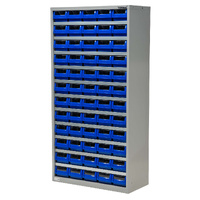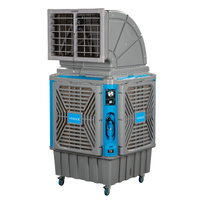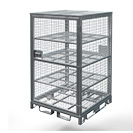The Role of Conveyors in Modern Warehousing and Manufacturing
Date Posted:20 January 2025
For businesses looking to improve operational efficiency, investing in the right conveyor system can make a significant difference in meeting production targets, ensuring on-time deliveries, and enhancing customer satisfaction.
In today’s fast-paced industrial environment, efficiency and automation are key drivers of success. The role of conveyors in modern warehousing and manufacturing cannot be overstated. These versatile systems are fundamental to optimising processes, reducing manual labour, improving safety, and increasing overall productivity. Whether in a distribution centre, manufacturing facility, or warehouse, conveyors are essential in moving goods seamlessly through various stages of production and distribution.
This blog explores the importance of conveyor systems, their applications, benefits, and how they contribute to the evolution of modern warehousing and manufacturing.
What are Conveyor Systems?
A conveyor system is a mechanical device or apparatus used to move materials, products, or packages from one location to another. They can be powered or non-powered, and they come in various designs to suit different applications. Powered conveyors typically use motors to drive belts, rollers, or chains to move items, while non-powered conveyors rely on gravity or manual handling.
Conveyors are available in numerous types, such as:
• Belt Conveyors: Widely used in manufacturing and packaging to transport bulk materials or packages.
• Roller Conveyors: Ideal for heavy-duty applications, including the transportation of large and cumbersome items.
• Chain Conveyors: Perfect for moving heavy loads, such as pallets and large machinery.
• Overhead Conveyors: Often used for the movement of products in assembly lines or for hanging items.
The Role of Conveyors in Modern Warehousing
In modern warehouses, the efficient movement of goods is crucial to maintaining productivity, meeting customer demands, and ensuring smooth operations. Conveyors significantly improve warehouse efficiency by automating the transportation of goods and reducing the need for manual handling.
Here are the key roles conveyors play in modern warehousing:
1. Efficient Material Handling
Material handling in a warehouse involves moving raw materials, goods in progress, and finished products through different stages of storage and shipping. Conveyors help streamline this process, ensuring that products are transported quickly and accurately between workstations, storage areas, and loading docks. Automated conveyors reduce the time spent on manual handling, allowing staff to focus on more critical tasks, such as order picking, packaging, and quality control.
2. Maximising Space Efficiency
Warehouses need to make the best use of available space to store and manage large volumes of products. Conveyors help optimise space by enabling the movement of goods in tight aisles and compact areas where forklifts or other machinery might not fit. By using vertical or overhead conveyor systems, warehouses can utilise the available vertical space, reducing the warehouse's footprint and allowing for more storage.
3. Enhancing Order Fulfilment
In today’s e-commerce world, speed is of the essence in order fulfilment. Conveyor systems play a vital role in reducing the time between order receipt and dispatch. Items can be automatically moved through picking stations, sorted according to order requirements, and delivered directly to packing stations. The integration of conveyors with barcode scanning or automated sorters improves accuracy and reduces the chance of errors, leading to faster processing times and higher customer satisfaction.
4. Improving Inventory Management
Modern conveyor systems can be integrated with warehouse management systems (WMS), providing real-time tracking of products and inventory. This integration allows for improved visibility, ensuring that stock levels are monitored accurately, and orders are processed based on up-to-date information. The automation of inventory handling through conveyors also reduces the risk of stock misplacement or damage, which is often a concern when goods are manually handled.
The Role of Conveyors in Manufacturing
Conveyors are equally important in manufacturing environments, where they facilitate the efficient movement of materials and products along the production line. In fact, conveyors have been integral to the development of assembly lines, particularly in industries like automotive, electronics, and food processing.
1. Streamlining Production Lines
In manufacturing, conveyors help transport raw materials, components, and finished goods across various production stages, from assembly to packaging. Automated conveyors enable a continuous flow of products through the assembly line, reducing bottlenecks and downtime. This streamlined process is essential for high-volume production, where any delay can disrupt the entire manufacturing operation.
For example, in an automotive assembly plant, conveyor systems move car parts along the line as workers assemble the vehicle, ensuring that each worker has the necessary parts to complete their task.
2. Minimising Manual Labour
Conveyors reduce the need for manual labour by automating the movement of materials and components. Workers no longer need to manually transport heavy or bulky items across the shop floor, which reduces the risk of injury and fatigue. This is particularly important in industries that deal with hazardous or heavy materials, as conveyors can be designed to safely handle these items without putting employees at risk.
Moreover, automated conveyors can be designed to deliver materials exactly where needed, which helps eliminate unnecessary movement and the associated costs.
3. Quality Control and Inspection
Conveyor systems in manufacturing also facilitate the integration of quality control and inspection stations into the production line. As products move along the conveyor, they can be inspected for defects, ensuring that only high-quality items reach customers. Automated systems can also detect faults, such as incorrect measurements or missing components, allowing for real-time corrections without halting the production line.
4. Improved Production Speed
In high-speed manufacturing environments, conveyors enable a faster production process by ensuring that materials are delivered to the right place at the right time. This speed not only reduces production cycles but also increases the overall throughput, allowing manufacturers to meet higher demand while maintaining quality standards. Automated conveyor systems can be integrated with robotics and other automation technologies to further optimise production speed.
Benefits of Conveyor Systems
The introduction of conveyor systems in warehousing and manufacturing brings numerous benefits:
• Increased Efficiency and Productivity: By automating the movement of materials, conveyors reduce the need for manual labour, thereby increasing the speed and accuracy of operations.
• Reduced Operational Costs: Although conveyors require an initial investment, their long-term benefits include lower labour costs and reduced operational downtime, ultimately leading to cost savings.
• Improved Safety: Conveyors minimise the risk of workplace accidents by reducing the need for employees to lift, carry, or transport heavy items, which can cause strain or injury.
• Better Product Flow: Conveyors ensure that products flow smoothly through the system, reducing delays and interruptions caused by human error or logistical issues.
• Scalability: Conveyor systems are scalable and can be adapted to accommodate growing warehouse or manufacturing operations. As businesses expand, conveyor systems can be reconfigured to suit new production or storage requirements.
The role of conveyors in modern warehousing and manufacturing cannot be underestimated. They are integral to optimising workflows, improving efficiency, and reducing operational costs. As industries continue to embrace automation, conveyor systems are evolving to meet the demands of high-speed production and the ever-growing need for accuracy and efficiency. With their ability to enhance inventory management, streamline production lines, and reduce manual labour, conveyors are undoubtedly a cornerstone of modern industrial operations. You can learn more about the Role of Conveyors in Streamlining Workplace Operations in our other blog.
For businesses looking to improve operational efficiency, investing in the right conveyor system can make a significant difference in meeting production targets, ensuring on-time deliveries, and enhancing customer satisfaction.
































































































































 Trolleys & Hand Trucks
Trolleys & Hand Trucks Cage Trolleys
Cage Trolleys Cleaning Carts & Trolleys
Cleaning Carts & Trolleys Construction Trolleys
Construction Trolleys Custom Trolleys
Custom Trolleys Hand Trucks & Dollies
Hand Trucks & Dollies Laundry/Linen Trolleys
Laundry/Linen Trolleys Lifting Trolleys
Lifting Trolleys Order Picking Trolleys
Order Picking Trolleys Panel Cart Trolleys
Panel Cart Trolleys Platform Trolleys
Platform Trolleys Powered Trolleys
Powered Trolleys Shelf & Tiered Trolleys
Shelf & Tiered Trolleys Shopping Trolleys
Shopping Trolleys Stainless Steel Trolleys
Stainless Steel Trolleys Tool Trolleys
Tool Trolleys Utility & Service Carts
Utility & Service Carts Lifting & Handling Equipment
Lifting & Handling Equipment Forklift Attachments
Forklift Attachments Jib Attachments
Jib Attachments Lifting Hoists & Pallet Hooks
Lifting Hoists & Pallet Hooks Load Skates & Tow Tugs
Load Skates & Tow Tugs Manual Stackers & Lifters
Manual Stackers & Lifters Pallet Jacks
Pallet Jacks Pallet Lifters
Pallet Lifters Pallet Rotators & Dispenser
Pallet Rotators & Dispenser Powered Pallet Trucks & Electric Lifters
Powered Pallet Trucks & Electric Lifters Scissor Lift Trolleys and Tables
Scissor Lift Trolleys and Tables Conveyor Equipment
Conveyor Equipment Conveyor Frames & Stands
Conveyor Frames & Stands Roller & Skate Conveyors
Roller & Skate Conveyors Ladders & Access Equipment
Ladders & Access Equipment Container & Yard Ramps
Container & Yard Ramps Ladders & Step Stools
Ladders & Step Stools Work Platforms & Crane Cages
Work Platforms & Crane Cages Drum Handling Equipment
Drum Handling Equipment Drum Storage & Bunding
Drum Storage & Bunding Drum Trolleys & Lifters
Drum Trolleys & Lifters Forklift Drum Handling
Forklift Drum Handling Waste Handling & Bins
Waste Handling & Bins Bin Lifters & Tippers
Bin Lifters & Tippers Plastic Waste & Wheelie Bins
Plastic Waste & Wheelie Bins Steel Waste & Tipping Bins
Steel Waste & Tipping Bins Waste Carts
Waste Carts Dangerous Goods Storage & Spillage
Dangerous Goods Storage & Spillage Aerosol Cans Storage Cages
Aerosol Cans Storage Cages Bunded Pallets & Storage
Bunded Pallets & Storage Corrosive Goods Storage Cabinets
Corrosive Goods Storage Cabinets DG Storage & Trolleys
DG Storage & Trolleys Flammable Liquid Cabinets
Flammable Liquid Cabinets Forklift Gas Storage Cages
Forklift Gas Storage Cages Site Storage
Site Storage Spill Kits
Spill Kits Shelving & Storage Equipment
Shelving & Storage Equipment Stillage & Transport Cages
Stillage & Transport Cages 750 Series Cage Configurations
750 Series Cage Configurations Heavy Duty Cabinets
Heavy Duty Cabinets Heavy Duty Shelving
Heavy Duty Shelving Mega Bins & Pallets
Mega Bins & Pallets Packing & Workbenches
Packing & Workbenches Parts Trays & Stor-Pak Bins
Parts Trays & Stor-Pak Bins Pegboard & Louvre Panels
Pegboard & Louvre Panels Plastic Bins & Crates
Plastic Bins & Crates Plastic Handling Solutions Bins
Plastic Handling Solutions Bins Plastic Pallets
Plastic Pallets Stack & Nest Bins
Stack & Nest Bins Pallet Racking Accessories
Pallet Racking Accessories Workplace Equipment
Workplace Equipment Modular Workbenches
Modular Workbenches Electric Height-Adjustable Workbenches
Electric Height-Adjustable Workbenches Floor Matting
Floor Matting General Workplace Equipment
General Workplace Equipment Industrial Weighing Scales
Industrial Weighing Scales Packaging Machinery
Packaging Machinery Stationery Cupboards
Stationery Cupboards Storage and Stillage Cages
Storage and Stillage Cages Tool Trolleys
Tool Trolleys Tooling Cabinets
Tooling Cabinets Workshop Fans and Coolers
Workshop Fans and Coolers Safety Barriers, PPE & Signage
Safety Barriers, PPE & Signage Barriers & Bollards
Barriers & Bollards First Aid Equipment
First Aid Equipment Gloves, Knives and PPE
Gloves, Knives and PPE Signage
Signage Cleaning & Site Supplies
Cleaning & Site Supplies Cleaning Equipment
Cleaning Equipment Cleaning Trolleys
Cleaning Trolleys Rubbish Bins
Rubbish Bins Signs & Traffic Supplies
Signs & Traffic Supplies Construction Equipment
Construction Equipment Construction Trolleys
Construction Trolleys Waste Handling
Waste Handling General Site Equipment
General Site Equipment Concrete Equipment
Concrete Equipment Site Storage
Site Storage Lifting Equipment
Lifting Equipment Verdex Specials
Verdex Specials









